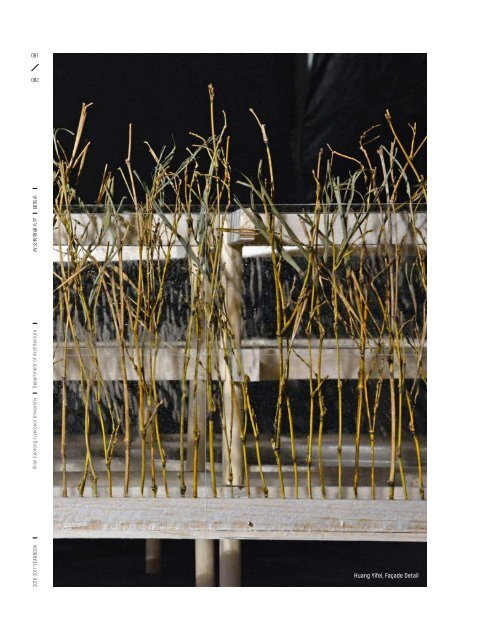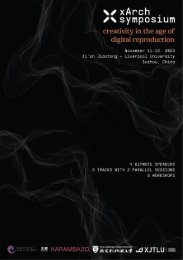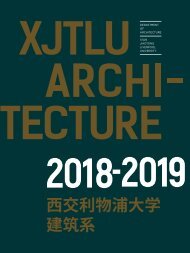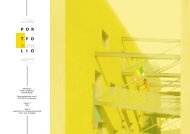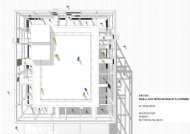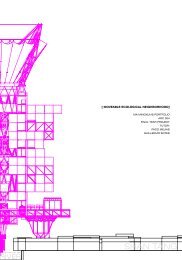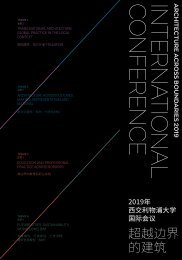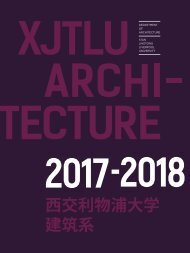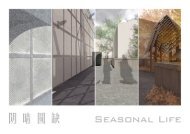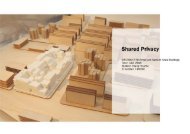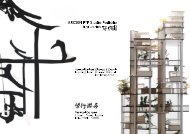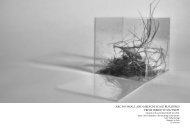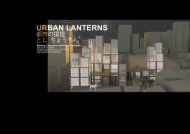YEARBOOK 2016 - 2017 | XJTLU DEPARTMENT OF ARCHITECTURE
The fourth edition of the yearbook of the Department of Architecture at Xi'an Jiaotong-Liverpool University presents student works created during the academic year 2016 - 2017. The yearbook exemplifies the new model for Chinese architectural education for which the department was commended by the Royal Institute of British Architects (RIBA). It is thus also a showcase of the creative culture that has guided our students in taking first steps to successful international careers as responsible and creative architectural designers. XJTLU offers RIBA Part 1, 2 and 3.
The fourth edition of the yearbook of the Department of Architecture at Xi'an Jiaotong-Liverpool University presents student works created during the academic year 2016 - 2017. The yearbook exemplifies the new model for Chinese architectural education for which the department was commended by the Royal Institute of British Architects (RIBA). It is thus also a showcase of the creative culture that has guided our students in taking first steps to successful international careers as responsible and creative architectural designers. XJTLU offers RIBA Part 1, 2 and 3.
Create successful ePaper yourself
Turn your PDF publications into a flip-book with our unique Google optimized e-Paper software.
081<br />
082<br />
ARC205<br />
Design Studio<br />
Design and Building Typology<br />
<strong>2016</strong>-<strong>2017</strong> <strong>YEARBOOK</strong> Xi’an Jiaotong-Liverpool University Department of Architecture 西 交 利 物 浦 大 学 建 筑 系<br />
Huang Yifei, Façade Detail<br />
Level 2<br />
( Year 3 | Semester 1 )<br />
Module Credits<br />
10<br />
Module Leader<br />
Aleksandra Raonic<br />
Teaching Team<br />
Yiping Dong<br />
Philip Fung<br />
Juan Carlos Dall' Asta<br />
Guest Critics<br />
Xu Liang<br />
( Atelier XUK Shanghai )<br />
Hu Ying<br />
(Suzhou University of Technology<br />
and Science )<br />
Vice Dean<br />
( School of Architecture and<br />
Urban Planning )<br />
Zhang Weiping<br />
( Design Director, Studio IFUP )<br />
Number of Students<br />
44<br />
Learning Spaces for Children Re-Imagined<br />
This brief responds to the stated intention of the Chinese government<br />
to prioritise education and to re-think the primary school educational<br />
model currently in operation in China. Aside from the readiness for<br />
change of the curriculum and the pedagogies used, this studio advances<br />
the significance of the physical environment that children learn both<br />
within and from.<br />
As such, students are asked to consider learning spaces as educational<br />
devices and to conceive of them as the Third Educator. The nature of<br />
spaces for learning in primary schools and kindergartens have been<br />
studied and proven to significantly impact upon children’s learning<br />
abilities and development.<br />
Through research and critical consideration of different educational<br />
models and theories in China and beyond (conventional, or alternative,<br />
traditional, or progressive, green or technology-focused) students are<br />
asked to gather a body of knowledge that enables them to develop an<br />
approach to primary schooling, and to envision how architecture’s often<br />
overlooked role in education can be challenged and re-imagined.<br />
The resulting designs ideally offer new primary school models for China<br />
that seek to successfully meet all the complexities and demands of<br />
modern Chinese society, are capable of embracing the high intensity of<br />
its continuous transformation, and are possibly even able to transform in<br />
response.<br />
Level 02 – Year 3<br />
B Eng Architecture Programme


